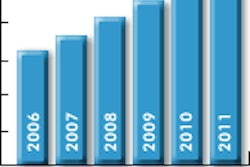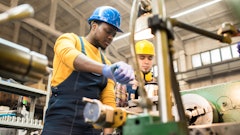Arlington, VA — March 5, 2007 — The European manufacturing sector, much like that of the United States and Japan, saw its industrial cycle peak in 2006 and will see its growth moderate in 2007, according to a new report from the Manufacturers Alliance/MAPI.
In a sign of manufacturing's sustainability, however, 23 of the 27 industries tracked in the report had inflation-adjusted production above the level of the previous year, indicating continued broad-based growth in the industrial sector, according to the alliance's Industrial Outlook for Europe - February 2007 report, which analyzes 27 major industries in the 27 member states of the European Union.
Top industry performers in 2006, recording year-over-year double-digit growth, were valves, tubes and electronic components (20 percent); machine tools (14.7 percent); optical instruments (14.3 percent); electric motors, generators, transformers (14.2 percent); aircraft and spacecraft (13.7 percent); and farm and forest machinery (10.8 percent).
Components Lead the Way
While the component manufacturers led European industrial growth, weakness was evident in four industries that declined: oil and gas (-7.0 percent); telecommunications transmitters (-5.1 percent); basic chemicals (-3.3 percent); and motor vehicles (-2.0 percent).
"The strength of component manufacturers points towards a healthy pipeline of orders for investment products," said Kris Bledowski, Ph.D., Manufacturers Alliance/MAPI economist and analysis author. "It confirms that it is in a mature phase of the (economic) cycle, but one in which demand for capital goods will hold up for awhile. The relative weakness of those few process industries that have contracted mildly is consistent with their turning earlier in the cycle than durable goods. Overall, European manufacturers will do well in 2007, perhaps better than their U.S. counterparts."
Bledowski writes that 16 industries are in the accelerating growth (recovery) phase of the business cycle; seven are in the decelerating growth (expansion) phase; two appear to be in the accelerating decline (either early recession or mid-recession) phase; and two are in the decelerating decline (late recession or very mild recession) phase of the cycle.
"Overall, only 15 percent — four out of 27 — of the industries examined are in a declining mode, and a rather mild one at that," he reports. "This testifies to a broad-based expansion that has all the hallmarks of being sustainable for another two to three years."
'07 Outlook Largely Positive
The analysis forecasts the macroeconomic outlook in Western Europe for 2007 to be positive, but manufacturing growth will decelerate virtually everywhere else. Overall, growth will be slower but more balanced than in 2006, with about equal contributions to gross domestic product from consumption and investment spending. Less investment in residential construction is expected to be offset by higher personal incomes, lower unemployment and better retail sales.
Central Europe should sustain its dynamism that was based last year largely on the manufacturing sector. While industrial production will decline from its robust double-digit pace, except for Hungary, the macro fundamentals remain strong. Bledowski envisions a general shift from exports as a key driver of growth toward domestic investment. The lone exception will likely be Poland, where retrenchment of capital formation will be offset by only slight weakening of exports.
"The picture that emerges [in Central Europe] is one of solid external balances, appreciating currencies, and constantly rising industrial productivity," Bledowski writes, "but also of wobbly political coalitions in all countries. This instability has created a legislative inertia and reluctance to advance further the much-needed structural reforms."
The Manufacturers Alliance/MAPI, established 1933, is a nonprofit organization engaged in economic and policy research, continuing professional education and allied activities. The alliance's corporate membership includes U.S.-based and international companies in manufacturing and related business services.
In a sign of manufacturing's sustainability, however, 23 of the 27 industries tracked in the report had inflation-adjusted production above the level of the previous year, indicating continued broad-based growth in the industrial sector, according to the alliance's Industrial Outlook for Europe - February 2007 report, which analyzes 27 major industries in the 27 member states of the European Union.
Top industry performers in 2006, recording year-over-year double-digit growth, were valves, tubes and electronic components (20 percent); machine tools (14.7 percent); optical instruments (14.3 percent); electric motors, generators, transformers (14.2 percent); aircraft and spacecraft (13.7 percent); and farm and forest machinery (10.8 percent).
Components Lead the Way
While the component manufacturers led European industrial growth, weakness was evident in four industries that declined: oil and gas (-7.0 percent); telecommunications transmitters (-5.1 percent); basic chemicals (-3.3 percent); and motor vehicles (-2.0 percent).
"The strength of component manufacturers points towards a healthy pipeline of orders for investment products," said Kris Bledowski, Ph.D., Manufacturers Alliance/MAPI economist and analysis author. "It confirms that it is in a mature phase of the (economic) cycle, but one in which demand for capital goods will hold up for awhile. The relative weakness of those few process industries that have contracted mildly is consistent with their turning earlier in the cycle than durable goods. Overall, European manufacturers will do well in 2007, perhaps better than their U.S. counterparts."
Bledowski writes that 16 industries are in the accelerating growth (recovery) phase of the business cycle; seven are in the decelerating growth (expansion) phase; two appear to be in the accelerating decline (either early recession or mid-recession) phase; and two are in the decelerating decline (late recession or very mild recession) phase of the cycle.
"Overall, only 15 percent — four out of 27 — of the industries examined are in a declining mode, and a rather mild one at that," he reports. "This testifies to a broad-based expansion that has all the hallmarks of being sustainable for another two to three years."
'07 Outlook Largely Positive
The analysis forecasts the macroeconomic outlook in Western Europe for 2007 to be positive, but manufacturing growth will decelerate virtually everywhere else. Overall, growth will be slower but more balanced than in 2006, with about equal contributions to gross domestic product from consumption and investment spending. Less investment in residential construction is expected to be offset by higher personal incomes, lower unemployment and better retail sales.
Central Europe should sustain its dynamism that was based last year largely on the manufacturing sector. While industrial production will decline from its robust double-digit pace, except for Hungary, the macro fundamentals remain strong. Bledowski envisions a general shift from exports as a key driver of growth toward domestic investment. The lone exception will likely be Poland, where retrenchment of capital formation will be offset by only slight weakening of exports.
"The picture that emerges [in Central Europe] is one of solid external balances, appreciating currencies, and constantly rising industrial productivity," Bledowski writes, "but also of wobbly political coalitions in all countries. This instability has created a legislative inertia and reluctance to advance further the much-needed structural reforms."
The Manufacturers Alliance/MAPI, established 1933, is a nonprofit organization engaged in economic and policy research, continuing professional education and allied activities. The alliance's corporate membership includes U.S.-based and international companies in manufacturing and related business services.
Related Stories










